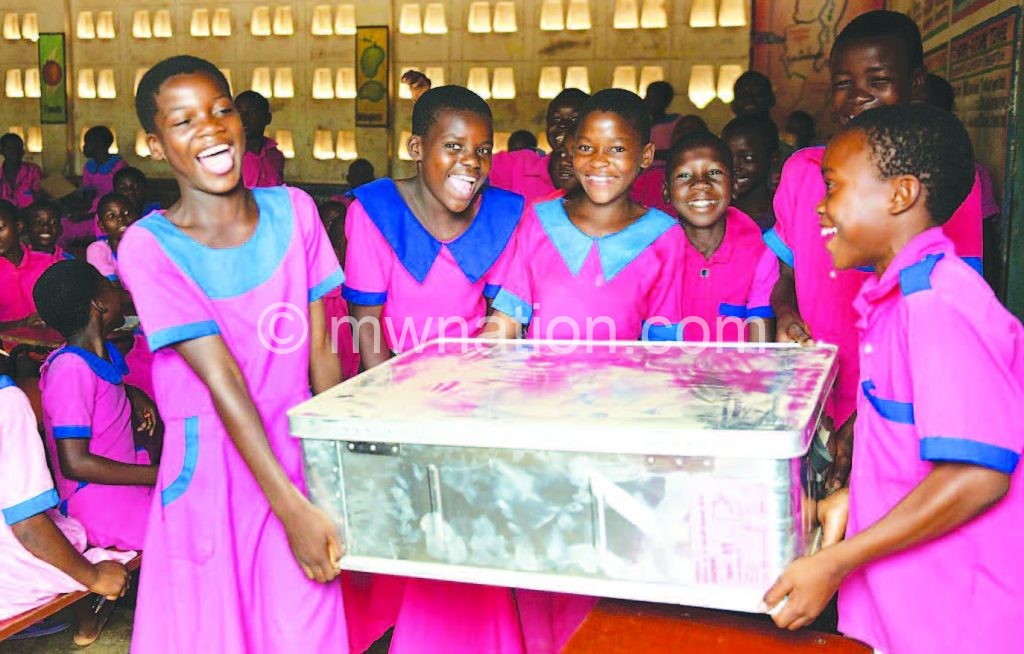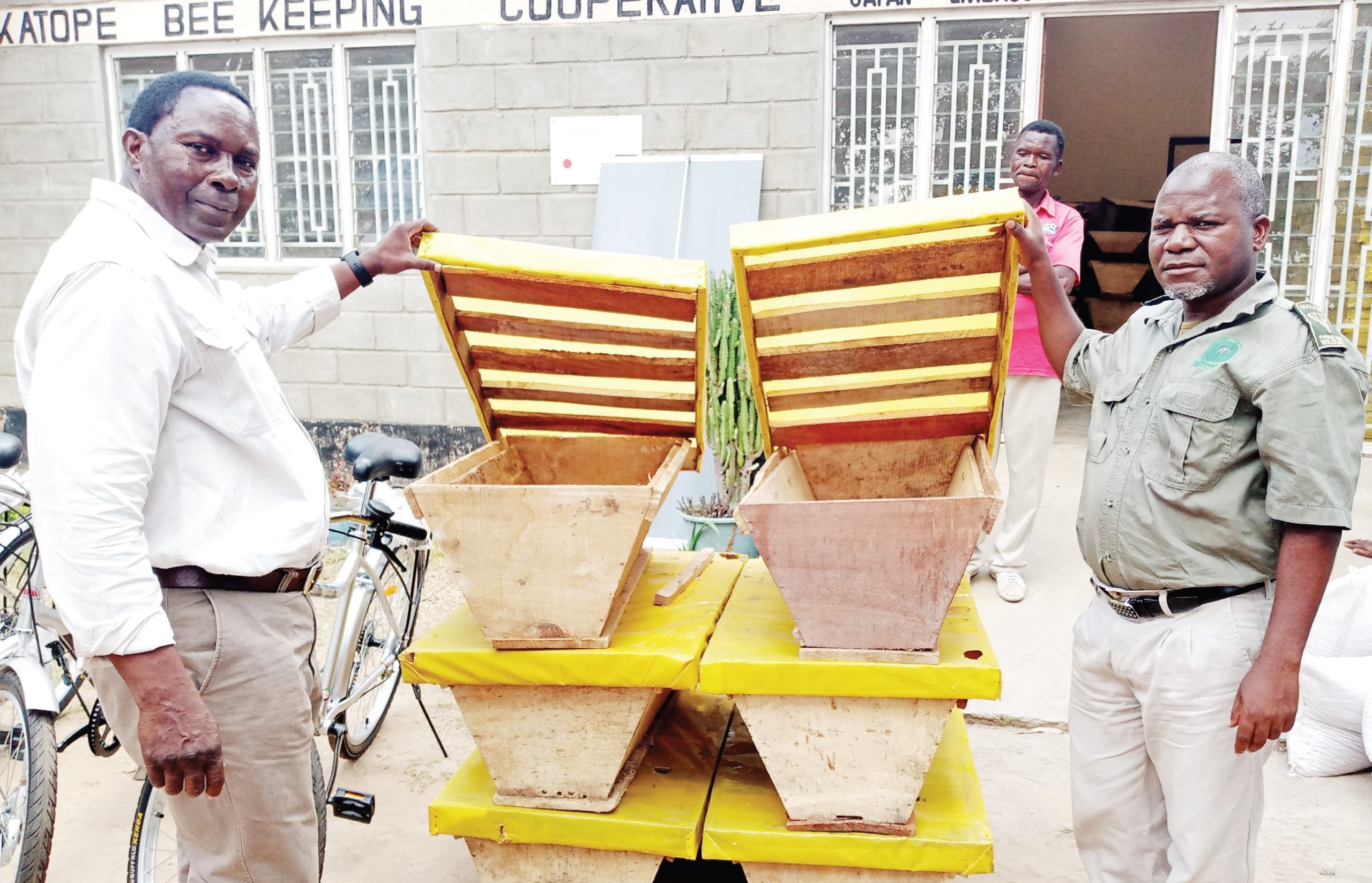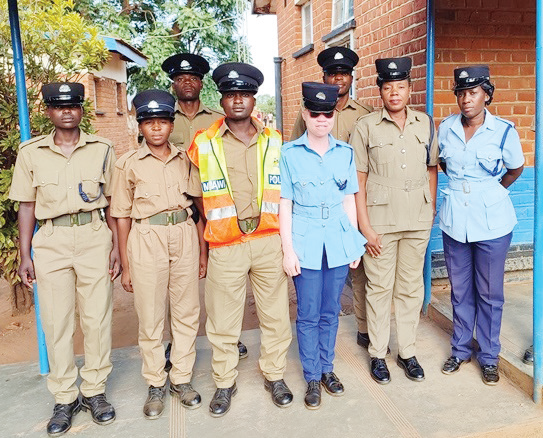School-in-box brings hope to learners
Natural disasters have several long-lasting effects on already vulnerable communities. In some cases, they lead to school delinquencies as poverty-stricken children struggle to go to school. However, school-in-a-box is bringing hope to learners recovering from emergencies in flood prone areas in the Lower Shire, Unicef Malawi’s PENELOPE KAKHOBWE and our staff writer JAMES CHAVULA report:
Patrick Bishop gleans as he shares his excitement about the recent supplies the school has received from Unicef.

Sitting behind the desk in his office at Bangula Full Primary School in Nsanje District where he has been headteacher for the past eight years, Bishop beams as he explains the impact that the school-in-a-box kit has had on the learners.
The school-in-a-box kit is part of the Unicef standard response in emergencies of the scope of Cyclone Idai which hit Malawi, Zimbabwe and Mozambique in March 2019.
“It has improved the attitude of learners at the school. The box comes with notebooks, slates and chalks which really helped the school get back on its feet after the effects of Cyclone Idai,” he says with a smile.
“Most learners had challenges accessing writing materials for their school-work. Now with the school-in-a-box kits, children show more interest in their studies.”
Natural disasters have several long-lasting effects on already vulnerable communities. In some cases, they lead to school delinquencies as poverty-stricken children struggle to go to school.
However, according to Bishop, the school-in-a-box kits have helped to curb this trend.
“The enrolment of girls has already improved. We currently have 1 747 girls against 1 849 boys who are enrolled in the school and the difference is very minimal,” he explains.
He attributes the high enrolment numbers at the school to the assistance pupils receive when they are there.
Bishop hails interventions such as the school-in-a-box kits as they help female learners access writing materials and ensure that they remain in school after being affected by natural disasters.
“Apart from learning materials, they now have bright blue bags to carry their books in and this helps keep their books clean and organised,” the headmaster says.
The other positive impact of the supplies, brought by Unicef with support from China Aid, is that the kit is not only focused on the academic aspect of the learners but also the recreational aspect.
The kit also includes footballs, netballs and markers for learners’ leisure activities—resources that most children in vulnerable communities never get.
“Since we received the kits, we now have a football and netball teams. Our school has played friendly matches with surrounding schools in the area,” says Bishop.
“The inclusion of these items has also motivated school attendance as learners look forward to coming to school knowing that they will have access to materials that will help them have a bit of fun.”
Priscilla Dave, one of the learners at the school, says the materials have been a motivating factor after having lost most of her school materials in the floods.
“A lot of things were destroyed such as our exercise books which had all of our notes in them,” she says. “We also had problems accessing new books for the new term. Our parents have so many things to take care of and things like books are not the first thing on their priority list.”
Dave is delighted by the provision of notebooks because it has lessened the burden of their parents and allowed them to focus on other essentials to allow them to get back on their feet.
Priscilla says the notebooks equip her to keep pace with her studies and get closer to achieving her dream of becoming a bank manager.
“My favourite subjects are Chichewa and mathematics because I know that to become a bank manager, I need mathematics and the books help me practice the subject when I am at home,” Priscilla says.
Delivering in emergencies
“Each box is a tale of hope for the affected children; an assuring story of enthusiasm and partnership to get schools back to speed after being hit by humanitarian emergencies,” says John Kulomba, deputy headteacher at Sekeni Primary School at Nchalo in Chikwawa District.
The school was among 174 schools in Malawi supported by the Education Cannot Wait Fund through Unicef to immediately establish temporary learning spaces following the disaster.
The school received seven boxes of basic educational materials and 195 school bags during the humanitarian emergency which affected almost half a million learners in more than 400 schools nationwide.
As torrents battered settlements in the floodplain that hosts Malawi’s largest sugarcane plantation of Nchalo, teachers at Sekeni picked waist-high heaps of soaked textbooks in a flooded staff room.
“This is an annual misfortune. The school is located in a low-lying area. In 2019, the floods reached the window level, destroying all books and teaching material in the staff room. We cannot tell the number of textbooks destroyed in the homes of teachers and learners,” Kulomba states.
This worsened the shortage of books as five children at the rural school share one textbook. All but two classrooms at the school were occupied by displaced people.
The two rooms were reserved for Standard Eight learners who were preparing for primary school leaving examinations and Standard One learners deemed too young to have classes outdoors on wet grounds in the midst of the rainy season.
Almost 20 months later, teachers and learners commend development partners fund for giving them a hand when the area was recovering from the floods.
“A friend in need is a friend indeed. The arrival of educational supplies during the 2019 disaster showed that Unicef really cares about children’s wellbeing. At our school, we appreciate the support we got when we needed it most.
“The boxes we got were boxes of love. They made the teaching and learning environment better for everyone. Some of the materials from the boxes are still in use today,” says the deputy headteacher.
Learning under tree shadows, one of the students Nelah Kaphatikiza, felt relieved when her school received 16 aluminum boxes containing basic teaching and learning materials. Each box contained assorted education materials for one teacher and up to 40 learners to schools hit hard by the floods.
“When a disaster strikes, learning suffers as our minds switch to things we lost and the immediate problems we go through,” Nelah says. “When classes resumed, I expected to be fighting for books with my classmates, but we did not only receive new textbooks but also notebooks, pencils, pens, erasers, mathematical sets and play things of different shapes.”
She says extra support, including balls and sporting kits, helped the affected children to keep playing together and shake off their agony. “After classes, we used to play different games instead of thinking about problems. This brought back smiles on our faces,” she explains.
Another learner, 11-year-old Mayamiko Mphepo, remembers getting more than just learning essentials when his teacher unlocked the box. Every box also contained teaching a wooden clock, colourful cubes for counting, a radio receiver as well as laminated alphabet, multiplication and number tables. The lid of the box doubled as a chalkboard in makeshift classes, easing the agony of learning in tents and tree shades.
“When floods happened, I lost hope of returning to school because my books and pens were gone, the school was closed, and our classroom was filled with people. The boxes came at the right time because everyone, including our parents, was worried about other things they lost during the floods. Our educational needs were not the first thing on their minds.”
Nelah and Mayamiko still use the school bags, sports kits and school-in-a-box supplies they received following the national disaster. They implore authorities to construct schools on higher grounds, not lowlands where floods ceaselessly disrupt their right to learn.





